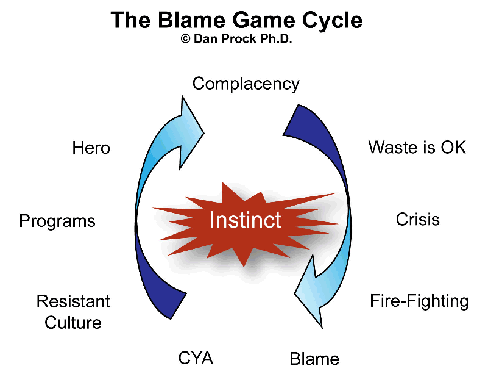Ackoff's Mess and Dilbert's World of Work
When organizations grow large, risks, errors and conflicts multiply exponentially. Management’s capability to solve problems and reduce risk falls behind this upward curve of problems – overwhelming most everyone. Systems theorist Russell Ackoff summarized the situation this way: “In the systems age, we don’t have problems, we have sets of interrelated problems. I have a special scientific name for this. I call it a mess.”
Unfortunately Ackoff’s Mess is just business as usual”in many big businesses, heath care providers, and service and knowledge work operations. It is made up of non-value added wasteful activity (over 90%), variability in inputs or work methods, and chronic overload of people and equipment. These conditions accumulate into periodic breakdowns and a negative culture
When firefighting problems traditional managers attempt to solve problems quickly and when they can't they play a game familiar to everyone who has ever had a job.
In many big companies and government organizations, the Blame Game perpetually refills a
swamp of wasteful processes and disengaged culture. In fact in one
training event at an automotive OEM, a supervisor spontaneously stood
up and yelled out “That’s exactly how we work every week!”

- The Blame Game begins with an organization complacent in Ackoff’s Mess of waste, accepted as the normal way of doing business. People avoid waste and problems, until they eventually ripen into a breakdown – like a late project, a lost contract or an angry customer.
- The breakdown triggers firefighting and aggressive 24/7 efforts by “all hands-on deck”. Yet soon after, feeling agitated or angry, managers blame the people closest to the crisis, not the system!
- With time and enough resources a “hero” figure emerges to solve the problem (but not the system that created it). Then everyone rests and avoids risk until the next “blame-game” episode begins.
Over several years, Gallup has shown that about two thirds of surveyed workers are "not engaged" or "actively disengaged" in their work; meaning they are emotionally disconnected and are less likely to be productive. (Source Gallup website). When Ackoff's Mess is mixed with the negative emotions of the Blame Game culture, a caustic culture of Dilbert's World results. I call the principles of that culture "Dilbert’s Law." (Term used with permission.)
- Due to size, scope and complexity big enterprises naturally generate lots of waste, problems, and confusion.
- When managers are unable to resolve waste and problems quickly, they use blame to push employees for results.
- Blame generates a culture of disengaged, even alienated employees, extending well beyond those directly criticized.
- Disengaged, alienated employees ignore problems or willfully cause new ones.
- Return to number one
In “Dilbert’s World”, people resist all change – even those intended to help them! What is the way out of Dilbert’s World?
Change leaders who are developed in the Sensei Way.